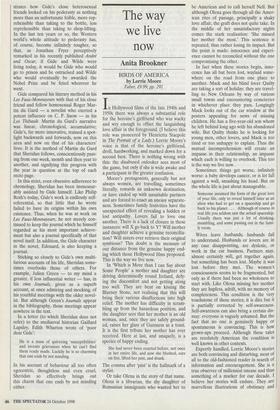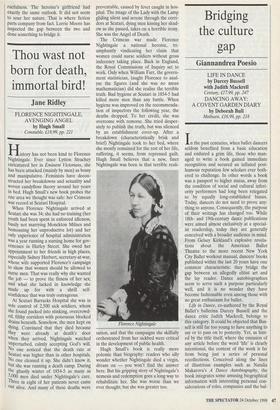The way we live now
Anita Brookner
BIRDS OF AMERICA by Lorrie Moore Faber, £9.99, pp. 291 In Hollywood films of the late 1940s and 1950s there was always a substantial role for the heroine's girlfriend who was wacky and wry enough to offset the languishing love affair in the foreground. (I believe this role was pioneered by Henrietta Stacpole in The Portrait of a Lady.) Lorrie Moore's voice is that of the heroine's girlfriend, droll, hardworking, and marked down for a second best. There is nothing wrong with this: the disabused onlooker sees most of the game, but only if she is wide awake and a participant in the greater confusion.
Moore's protagonists, generally but not always women, are travelling, sometimes literally, towards an unknown destination, or have ended up with unsuitable partners and are forced to enact an uneasy separate- ness. Sometimes family festivities have the unexpected effect of revealing a hidden or lost antipathy. Lovers fail to love one another. There is a lack of closure in these instances: will X go back to Y? Will mother and daughter achieve a genuine reconcilia- tion? Will sisters ever retrieve their original symbiosis? This doubt is the measure of our distance from the genuine happy end- ing which those Hollywood films proposed. This is the way we live now.
In 'Which is More than I can Say about Some People' a mother and daughter are driving determinedly round Ireland, defy- ing the discomfort and not getting along too well. They are bent on kissing the Blarney Stone, not realising that this will bring their various disaffections into high relief. The mother has difficulty in scram- bling up from the hazardous position, and the daughter sees that her mother is an old woman, and, once they are safely ground- ed, raises her glass of Guinness as a toast. It is the first tribute her mother has ever received. Here at last, and uniquely, is a species of happy ending.
She had never been courted before, not once in her entire life, and now she blushed, ears on fire, lifted her pint, and drank.
The comma after 'pint' is the hallmark of a stylist.
Or take Olena in the story of that name. Olena is a librarian, the shy daughter of Romanian immigrants who wanted her to be American and to call herself Nell. But although Olena goes through all the Amer- ican rites of passage, principally a shaky love affair, the graft does not quite take. In the middle of her unsatisfactory nights comes the stark realisation: 'She missed her mother the most.' This sentence is repeated, thus rather losing its impact. But the point is made: innocence and experi- ence cannot be reconciled without the one compromising the other.
In fact when these stories begin, inno- cence has all but been lost, waylaid some- where on the road from one place to another. Mack and his blind lover Quilty are taking a sort of holiday; they are travel- ling to New Orleans by way of various small towns and encountering cemeteries in whichever place they pass. Longingly Mack looks out of the car window at the posters appealing for news of missing children. He has a five-year-old son whom he left behind long ago with his abandoned wife. But Quilty thinks he is looking for young men, other lovers, and Mack is too tired or too unhappy to explain. Thus the mutual incomprehension will create an impasse in their relationship, an impasse which each is willing to overlook. This too is the way we live now.
Sometimes things get worse, infinitely worse: a baby develops cancer, or is let fall against a wall, smashing his head. But on the whole life is just about manageable.
Someone assumed the form of the great love of your life, only to reveal himself later as an alien who had to get on a spaceship and go back to his planet . .. Although of course in real life you seldom saw the actual spaceship. Usually there was just a lot of drinking, mumbling, and some passing out in the fami- ly room.
Wives leave husbands; husbands fail to understand. Husbands or lovers are in any case disappointing, are dyslexic, or work in the car business. Partners may, almost certainly will, get together again, but something has been lost. Maybe it was lost before they met. The women's consciousness seems to be fragmented, but only as if there had been no wholeness to start with. Like Olena missing her mother they are hapless, adrift, with no memory of completeness. This condition is the very touchstone of these stories; it is dire but it is partially corrected by self-awareness. Self-awareness can also bring a certain dis- may: everyone is vaguely ashamed. But the fact that no one is genuinely happy or spontaneous is convincing. This is how grown-ups proceed. Although these tales are resolutely American the condition is well known in other contexts.
Expertly handled, Lorrie Moore's stories are both convincing and disturbing, most of all to the old-fashioned reader in search of information and encouragement. She is a true observer of millennial unease and thus something of a marker for our decade. I believe her stories will endure. They are marvellous illustrations of obstinacy and ruefulness. The heroine's girlfriend had exactly the same outlook. It did not seem to sour her nature. That is where fiction parts company from fact. Louie Moore has inspected the gap between the two and done something to bridge it.



















































































 Previous page
Previous page